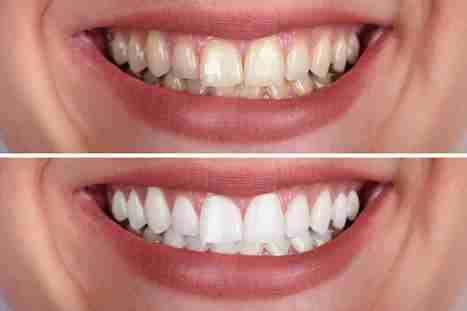How Your Diet Influences the Longevity of a Brighter Smile

A bright, white smile is commonly linked to good health, self-assurance, and charm. Whether it's the result of professional whitening or diligent home care, many people work hard to achieve that luminous glow. However, while whitening procedures offer a significant boost, the results aren't permanent without conscious upkeep.What many people overlook is that the secret to keeping your smile bright lies not just in your oral hygiene routine, but also on your plate. Diet plays a surprisingly large role in either preserving or dulling your whitened teeth. This article explores the science behind staining, the foods that help or hinder brightness, and the simple dietary habits you can adopt to prolong your smile’s radiance.
Understanding Tooth Discolouration: The Hidden Culprit
Teeth discolouration occurs in two primary forms: extrinsic staining from food and drink on the enamel, and intrinsic staining due to internal tooth changes. Whitening treatments, such as those provided by a dentist in Sheffield, mainly address extrinsic stains. However, whitened teeth can easily stain again without proper dietary care.
Common culprits include:
- Chromogens: Pigments that stick to enamel
- Tannins: Found in tea, wine, and some fruits
- Acids: Wear down enamel and enhance stain absorption
A mindful diet becomes essential post-whitening, helping to preserve the brightness and prevent rapid discolouration.
Staining Offenders: What to Limit or Avoid
Some everyday foods and drinks can rapidly dull a bright smile if consumed frequently or without precaution. Here’s a quick reference:
|
Food/Drink |
Why It Stains |
|
Black coffee & tea |
Contain tannins and chromogens that bind to enamel |
|
Red wine |
High in acidity and dark pigments |
|
Cola & soft drinks |
Both acidic and sugary, eroding enamel and attracting stains |
|
Berries (blueberries, blackberries) |
Rich in natural pigments |
|
Tomato-based sauces |
Acidic with deep red colouring |
|
Curry |
Contains strong yellow and orange pigments |
|
Balsamic vinegar |
Sticky and pigmented, clings to teeth |
|
Soy sauce |
Dark and penetrating |
Even natural and nutritious foods like berries can have a staining effect. It’s not about eliminating these altogether but being mindful of their frequency and pairing them with protective habits.

Smile-Friendly Foods That Defend Brightness
Just as there are staining culprits, there are also foods that support a white smile. These items naturally help clean your teeth or provide nutrients that strengthen enamel:
- Crunchy fruit and vegetables (e.g., apples, carrots, celery): Act like a gentle scrub, reducing residue buildup.
- Cheese and plain yoghurt: Neutralise acidity and replenish calcium, supporting enamel resilience.
- Water: The most overlooked remedy. It helps remove food debris and supports consistent saliva production.
- Nuts and seeds: Mild abrasiveness cleans tooth surfaces while adding minerals.
Integrating these into your regular diet won’t just help protect your whitened teeth, it supports broader oral and overall health.
Smart Habits for Eating Post-Whitening
Following teeth whitening, many Sheffield patients frequently inquire about which foods and drinks will help maintain their results over time. The first 48 hours post-whitening are particularly crucial, as the enamel is more porous and vulnerable.
Here’s how to protect your smile:
- Follow the "white diet": Stick to light-coloured foods like chicken, rice, bananas, and milk for the first two days.
- Use a straw: For coffee, tea, or juices, use a straw to minimise contact with teeth.
- Rinse with water: After consuming acidic or coloured foods, rinse to reduce residue.
- Delay brushing: After consuming acidic foods, wait at least 30 minutes before brushing to prevent harming the softened enamel.
- Balance meals: Pair acidic items with calcium-rich ones to buffer enamel erosion.
Maintaining these routines can greatly prolong the longevity of your whitening outcomes.
Everyday Diet and Lifestyle Habits to Support Whiteness
Long after the whitening treatment has faded, your lifestyle and diet continue to shape your smile. Incorporating these long-term habits ensures better oral health and sustained brightness:
- Limit snacks: Especially sugary ones that feed bacteria.
- Drink water throughout the day: Keeps your mouth clean and moist.
- Consume enamel-supporting nutrients: Calcium, phosphorus, and vitamin D are essential.
- Minimise alcohol and tobacco: Both accelerate discolouration and decay.
- Chew sugar-free gum: Stimulates saliva and helps clean teeth between meals.
Your dentist in Sheffield may also recommend fluoride treatments or remineralising pastes to reinforce your teeth against everyday wear.
When to See a Professional for Ongoing Whitening Support
Even with the best care, discolouration can return due to factors like ageing, lifestyle habits, or internal tooth issues. When that happens, professional guidance becomes essential.
Here’s how expert support can help:
- Whitening touch-ups restore brightness
- Deep treatments target stubborn intrinsic stains
- Regular cleanings reduce plaque and surface discolouration
If your results from teeth whitening Sheffield treatments fade quickly, your dentist can personalise a plan. This may include updated oral hygiene routines or dietary tips aligned with your eating habits, helping you maintain a lasting, radiant smile.
Smile, Confidence, and Nutritional Wellness: A Triple Connection
The state of your teeth doesn’t only influence oral health, it deeply impacts your mental wellbeing. A bright, confident smile can uplift self-esteem and promote positive social interactions.
Here’s how a healthy smile contributes:
- Boosts confidence in both personal and professional life
- Encourages more frequent smiling, releasing feel-good endorphins
- Inspires better dietary choices and self-care routines
People who take pride in their smile often build healthier lifestyles overall. When diet, mental health, and oral care align, it creates a powerful synergy, making the effort to maintain your white smile a step toward holistic wellness.
Conclusion
Maintaining a bright smile goes far beyond whitening gels or professional procedures, it’s a daily commitment influenced largely by what you eat and how you care for your teeth. While modern whitening methods offer impressive results, your diet is the key to keeping them intact. From avoiding heavily pigmented foods to embracing crunchy vegetables and calcium-rich snacks, each choice contributes to your long-term oral aesthetic. It's not about giving up your favourite treats entirely, but about making mindful decisions that align with your smile goals.If you're serious about preserving that glow, think of every meal as either supporting or challenging your teeth. And when in doubt, don’t hesitate to seek expert advice. The experienced team at Sheffield is always ready to guide you toward a healthier, brighter future one meal and one smile at a time.
- Information Technology
- Office Equipment and Supplies
- Cars and Trucks
- Persons
- Books and Authors
- Tutorials
- Art
- Causes
- Crafts
- Dance
- Drinks
- Film
- Fitness
- Food
- Oyunlar
- Gardening
- Health
- Home
- Literature
- Music
- Networking
- Other
- Party
- Religion
- Shopping
- Sports
- Theater
- Wellness



